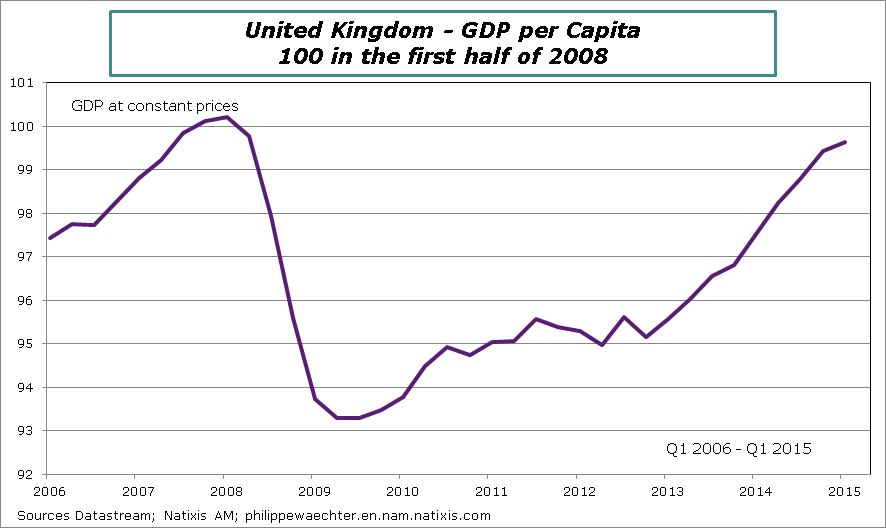In 2016 a referendum on UK membership of the European Union will be held, probably in June. There is a strong political background on this issue but it’s not the purpose of this post. I want to focus on the economic impact of the Brexit. On this point, the situation is not easy.
Part of question on Brexit takes its roots in the weak recovery seen in the UK (the term appeared at the end of 2012). The GDP per capita profile is still below its pre-crisis level and has been long to converge to it. Until the beginning of 2013 and a more accommodative fiscal policy there was no catch up. This showed that the economy is not performing that well and the current economic performance is specific, not comparable to what was seen in the past.
This leads to two remarks
1 – The current recovery is the weakest seen in the United Kingdom. It has never been so long to catch up to the pre-crisis level than during the current period. The economy is not performing strongly, probably because its own fundamentals lack of soundness. Productivity has been too low because investment was not strong enough (see here for details)
2 – When we see the world economy, the most problematic issue is its low momentum. This can be seen through a very low growth in world trade. On a year it’s lower than 1%. In other words, trade is no more a source of impulse for growth. This situation is coming from the fact that no country is able play the role of engine for global growth. In the past, the US and more recently China played that role. They were able to grow rapidly and strongly after a negative shock and to create a spillover onto other regions of the world. This is no longer the case. It means that every region will have to support its own expansion and will not have to expect a strong impetus from another part of the world. This means that economic policies will remain accommodative. (see here for details)
These two remarks sound clear for the UK. If the world trade momentum is weak, this means that every region will have to feed its own strength. For the UK it means that it has to strengthen its momentum to first catch up its GDP per capita pre-crisis level and then being able to go above. In this framework, UK mustn’t expect that the rest of the world will be a source of strong dynamics. Nevertheless on a regional scale, at the European level, there is still an important momentum on trade. UK exports are pointing in the direction of the European Union; in 2014 it was more than 50%.
If growth has to be found, first, at a regional level, then UK has all the reasons to stay in a cooperative situation with the rest of Europe. It will be a source of growth and of jobs.



